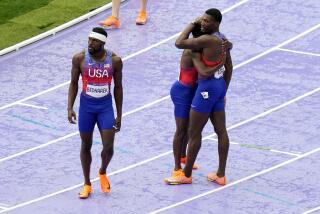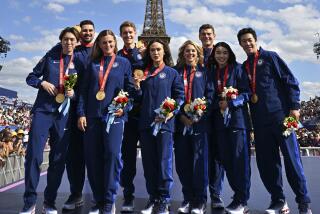U.S. Slides Into Turmoil
- Share via
CESANA PARIOL, Italy — Americans might not understand the inner workings of skeleton, but they embraced the sport four years ago in Salt Lake City. It was fast, bordering on insane. It looked cool on television. And the U.S. won the men’s and women’s gold medals.
Four years later, the sport could be tilted back toward obscurity in America. The U.S. coach didn’t make it to Italy, fired two weeks ago after allegations of sexual harassment. The top U.S. racer didn’t make it to the races, sent home after a bizarre doping violation. And the U.S. won no medals in these Olympics.
“This,” Jim Shea Jr. said, “is not a disaster.”
Shea won gold four years ago, then retired. He watched Friday as the Canadians ruled the track, with Duff Gibson winning the gold medal and Jeff Pain the silver. Switzerland’s Gregor Staehli won the bronze, with Eric Bernotas in sixth as the top U.S. finisher.
The U.S. athletes insisted the turmoil did not affect their performance.
“It’s been a long trip for us, but this team has really stuck together,” said Chris Soule, who finished 25th in the 27-man field. “We’ve been resilient.”
Skeleton gets one chance every four years to capture America’s attention. In the weeks before these Olympics, as Americans soaked up heartwarming stories of skiers and skaters, the skeleton racers lost their moment for hype and glory.
Tim Nardiello, the coach, was suspended Dec. 31, accused of sexually harassing two women on the team. An arbitrator found no evidence to support the allegations and reinstated him, but the U.S. Bobsled and Skeleton Federation fired him Feb. 3, citing insubordination.
Zach Lund, the top American racer, was given a public warning by U.S. officials after testing positive for a substance that can be used to mask doping agents. Lund said he used an anti-baldness product that included the substance. On Feb. 10, hours before the opening ceremony, the international sport court suspended him for one year.
Kevin Ellis, who finished 15th, said Lund contacted his teammates Friday, wishing them good luck via text messages from the U.S.
“I miss Zach Lund a lot,” Shea said. “Every time I think about it, I get choked up. I know he’ll be back, and he’ll be back with a vengeance.”
If the Nardiello and Lund stories deprived the Olympians of glory, Bernotas said, so be it.
“If everyone else wants to focus on that, that’s OK. It doesn’t make us feel any less respected,” he said. “We do it because we love it.”
Shea bristled at any suggestion that the sport he helped popularize four years ago had been permanently wounded.
“Other federations are going through their turmoils,” he said. “Great riders fall down a lot, but they always get back up. It’s a test of our program. We’ll get through it.”
Bernotas hadn’t even tried the sport four years ago, an example of how rapidly a talented athlete can advance to elite status. Shea said “great track athletes” can get there in two years, and he pledged the best days of U.S. skeleton are still to come, perhaps by targeting adrenaline junkies looking for the next great extreme sport.
“This sport is going to explode,” he said. “It’s exploding in Europe. It’s cheap. It’s extreme. Bobsled is the champagne. Skeleton is the moonshine.”
More to Read
Go beyond the scoreboard
Get the latest on L.A.'s teams in the daily Sports Report newsletter.
You may occasionally receive promotional content from the Los Angeles Times.







